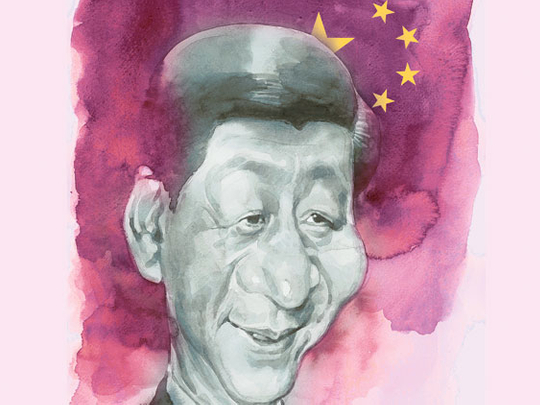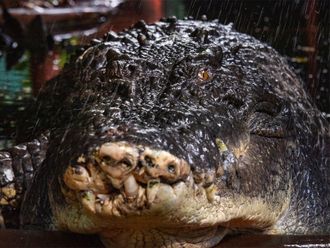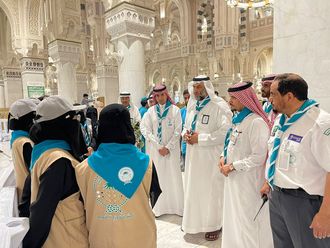
Xi Jinping, who is expected to take the helm of the world's second-largest economy and fastest-rising power from late this year, is shaping an image very different from that of the present Chinese president, Hu Jintao. While Hu is determinedly anonymous, Xi is "a big personality", according to those who have met him.
Standing more than six feet tall, he is confident and affable. He boasts a ready smile and a glamorous second wife — the renowned People's Liberation Army singer Peng Liyuan. He has expressed his fondness for US war films and, perhaps more surprisingly, praised the edgy independent filmmaker Jia Zhangke.
This is, in part, a generational and social shift. Xi is 58 and, like the other rising stars in Chinese politics, grew up in the era of reform and opening. While Hu's first visit to the United States was in 2002, Xi and his peers have travelled frequently, and several have personal links with the West. Xi's daughter is studying at Harvard and a sister is thought to live in Canada. And he is a "princeling" — who has experienced both privilege and prejudice as the child of a powerful Communist-party figure.
Xi was born in 1953 to Xi Zhongxun, a Long March hero who later became a vice-premier, and Qi Xin. He grew up in the relative comfort of Zhongnanhai, the party elite's red-walled Beijing compound.
But when he was only nine, his father fell from grace with Mao Zedong. Six years later, as the cultural revolution wreaked havoc, young Xi was dispatched to the dusty, impoverished northwestern province of Shaanxi to "learn from the masses".
He spent seven years living in a cave home in Liangjiahe village. Xi has described struggling with the fleas, the hard physical labour and the sheer loneliness.
There is, of course, a well-established Communist iconography of learning to serve the people. But political commentator Li Datong suggests this "double background" has proved genuinely formative for princelings such as Xi and might even lead them to bolder policymaking.
"One aspect is their background as children of the country's founders; the other is their experience of being sent to the countryside, which made them understand China's real situation better. It gives this generation a strong tradition of idealism and the courage to do something big," he said.
Although he has openly criticised the cultural revolution, Xi embraced the party; in a WikiLeaks cable an academic who knew Xi as a young man suggested he "chose to survive by becoming redder than red".
Family links helped him win a place studying chemical engineering at the elite Tsinghua University, followed by a post as aide to a powerful military leader, Geng Biao — the beginning of his useful People's Liberation Army (PLA) connections.
Next came a more surprising move — his choice, says political expert Zhang Xiaojin, to an unglamorous post in Hebei province. He may have hoped to shake off suggestions of benefiting from his family name.
It was as deputy secretary of Zhengding county that he visited Muscatine, a little-known US town. "He was a polite and kind guy. I could see someone very devoted to his work," said Eleanor Dvorchak, who hosted Xi in her son's old room.
The acquaintance who spoke to Wiki-Leaks claimed Xi always had his "eye on the prize" of a major party post. He transferred to southern Fujian province in 1985, climbing steadily upwards over 17 years. Most of his experience has been earned in China's relatively prosperous, entrepreneurial coastal areas, where he courted investors and built up business, proving willing to adopt new ideas.
After the toppling of Shanghai's party secretary Chen Liangyu in a corruption scandal, Xi took charge of the city in 2007. Barely six months later his elevation to the politburo standing committee, the top political body, signalled that he was expected to succeed Hu. In October 2010 his appointment as vice-chair of the central military commission cemented his position. He describes his own thinking as pragmatic and, throughout his rise, he has cultivated a down-to-earth image; in the provinces he ate in government canteens and often dressed down. And in a system known for corruption, he has a clean reputation.
But while Xi is well-liked and adept at glad-handing, he appears to give little of importance away. The US ambassador Gary Locke recently observed that he was "very personable" but that US officials "really don't know that much about him".
Close association with particular policies or factions has its dangers. Becoming general secretary of the party, and thus leader of China, is "an issue of who opposes you rather than who supports you", said Kerry Brown, head of the Asia programme at Chatham House.
Xi's networks are unusually broad, according to Brown: "Provincially; through his family; and with the military through Geng Biao. His elevation is in the interests of the widest group of people and opposed by the smallest group." It is the same relatively small elite who will determine what he can do with the job.
Xi's confidence in overseas dealings does not necessarily indicate a more emollient approach to foreign relations. His most-quoted remark to date was made on a trip to Mexico in 2009: "There are some well-fed foreigners who have nothing better to do than point fingers at our affairs. China does not, first, export revolution; second, export poverty and hunger; third, cause troubles for you. What else is there to say?"
To read Xi as a man in sole control of the agenda is to misunderstand the Chinese political system. He will be "first among equals" in the nine-member standing committee, say analysts. Hu and other former leaders will still exert influence; and 2011's five-year plan has plotted the immediate course. Some think Xi's networks may allow him to strike out more confidently than Hu. Others think he will struggle to win support for bold decisions needed to tackle the country's mounting challenges. "I think he's a more instinctive and gut-driven politician and may surprise us. Others say the system and the vested interests around him are too strong," Brown said.
His leadership will be shaped by his colleagues and framed by external forces. "What's important is to be on the right side of history," said Cheng Li of the Brookings Institution in Washington. "He himself probably does not know what he will do."












